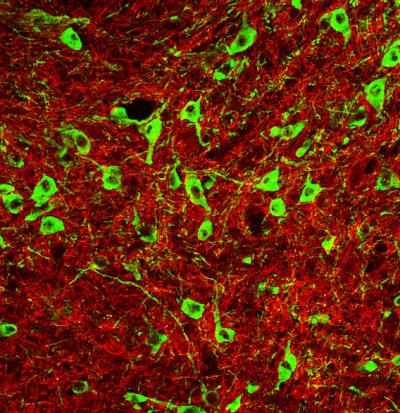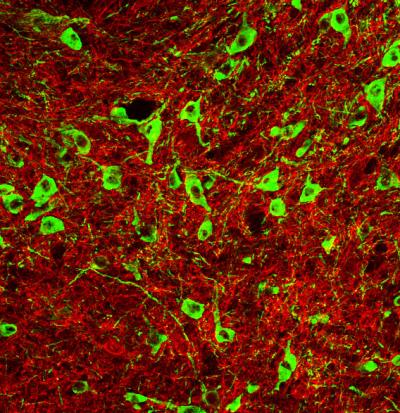
Credit: John Dani, PhD, Perelman School of Medicine, University of Pennsylvania
PHILADELPHIA – Stress, defined broadly, is a well-known risk factor for later alcohol abuse; however, the brain chemistry underlying interactions between stress and alcohol remain largely unknown. Reinforcement of addictive substance use and stress signaling involves common neural systems, including the brain reward center. Better understanding the brain chemistry involved in stress and increased alcohol consumption could have implications for getting to the root of such disorders as post-traumatic stress disorder (PTSD).
A team led by John Dani, PhD, chair of the department of Neuroscience in the Perelman School of Medicine at the University of Pennsylvania, found that rodents that had been exposed to stress had a weakened alcohol-induced dopamine response and voluntarily drank more alcohol compared to controls. The blunted dopamine signaling to ethanol arose due to changes in the circuitry in the ventral tegmental area, the heart of the brain's reward system. The team published their findings in Neuron.
Stress alters the intricate system of checks and balances in the firing and quiescence of many types of neurons. "These effects happen at the minute level of potassium, chloride, and other ions moving across the neuron outer membrane via channels and transporters," Dani said. "In addition, by chemically blocking stress hormone receptors on neurons, we prevented stress from causing increased drinking behavior."
Rats were exposed to an acute stress for one hour, and then 15 hours later, researchers measured the amount of sugar water laced with ethanol that the mice drank. The stressed rats drank significantly more than controls, and the increase was maintained for several weeks.
Why does stress cause a latent effect on neural circuitry? "The stress response evolved to protect us, but addictive drugs use those mechanisms and trick our brains to keep us coming back for more," Dani said.
The most interesting finding, the researchers say, is that after the stress, the reward circuitry looked normal at first glance when they examined the rats' neurons. However, if the circuits were strongly used, in this case via consumption of ethanol, alterations to neurons were noticeable and the dopamine response to alcohol was blunted. The change in neuron physiology means that a specific set of neurons that are normally inhibitory flip and become excitatory. This flip alters the rats' response to ethanol, making them consume more and more.
To reverse the negative effects of the erroneous excitatory signal, the team chemically prevented the excitatory switch within the reward circuitry. This correction prevented the blunted alcohol-induced dopamine signal, causing the stressed rats to consume less alcohol. "We gave the rats a chemical called CLP290 to restore the stress-altered circuitry to normal, which in turn corrected the firing of the dopamine neurons."
From this, the team now has an inroad to observe how the reward circuitry is altered by stress, providing a model system to probe related brain physiology. "This line of research has implications for people with PTSD who have an increased risk for over-use of alcohol and drugs," Dani said. The team is now talking with other researchers to study compounds that potentially normalize the firing of neurons in the brain's reward system to help control the over-consumption of alcohol.
###
Lead co-authors are Alexey Ostroumov and Alyse Thomas, both from Penn.
This work was supported by the National Institutes of Health (NS21229, DA09411).
Penn Medicine is one of the world's leading academic medical centers, dedicated to the related missions of medical education, bio-medical research, and excellence in patient care. Penn Medicine consists of the Raymond and Ruth Perelman School of Medicine at the University of Pennsylvania (founded in 1765 as the nation's first medical school) and the University of Pennsylvania Health System, which together form a $5.3 billion enterprise.
The Perelman School of Medicine has been ranked among the top five medical schools in the United States for the past 18 years, according to U.S. News & World Report's survey of research-oriented medical schools. The School is consistently among the nation's top recipients of funding from the National Institutes of Health, with $373 million awarded in the 2015 fiscal year.
The University of Pennsylvania Health System's patient care facilities include: The Hospital of the University of Pennsylvania and Penn Presbyterian Medical Center — which are recognized as one of the nation's top "Honor Roll" hospitals by U.S. News & World Report — Chester County Hospital; Lancaster General Health; Penn Wissahickon Hospice; and Pennsylvania Hospital — the nation's first hospital, founded in 1751. Additional affiliated inpatient care facilities and services throughout the Philadelphia region include Chestnut Hill Hospital and Good Shepherd Penn Partners, a partnership between Good Shepherd Rehabilitation Network and Penn Medicine.
Penn Medicine is committed to improving lives and health through a variety of community-based programs and activities. In fiscal year 2015, Penn Medicine provided $253.3 million to benefit our community.
Media Contact
Karen Kreeger
[email protected]
215-349-5658
@PennMedNews
http://www.uphs.upenn.edu/news/




